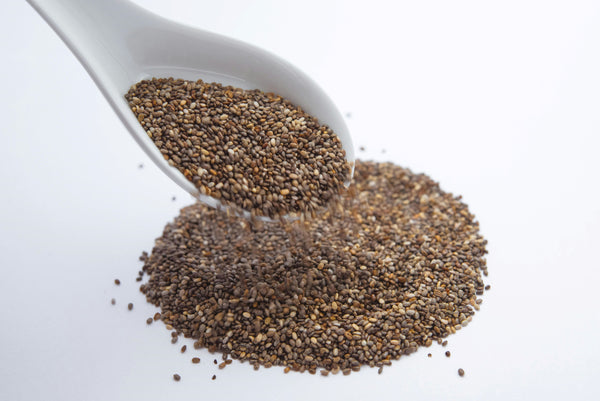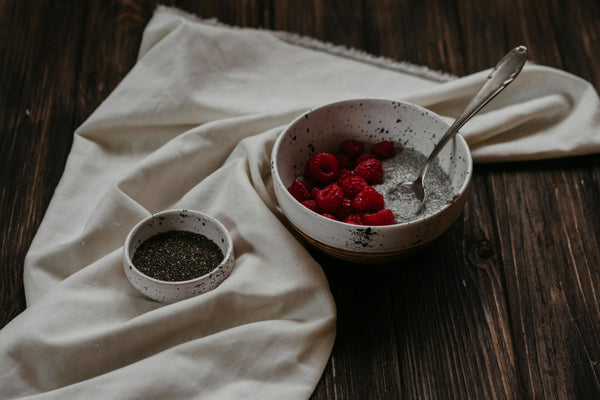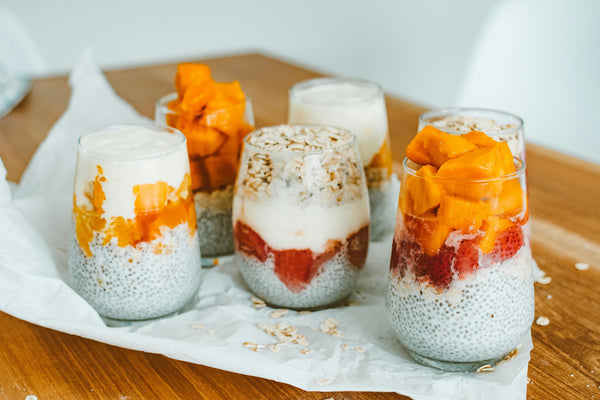Chia seeds are nutrient-dense powerhouses that have gained popularity in the health and wellness world. But if you're not eating them regularly, you may be wondering just how long these tiny seeds can last. From the pantry to the refrigerator, proper storage is key to ensuring the longevity of chia seeds. So, how long do chia seeds last for? Let's explore the shelf life of these versatile superfoods.
What Are Chia Seeds?
Chia seeds are very small black seeds derived from the plant Salvia hispanica, native to Central and South America. These seeds have gained popularity for their numerous health benefits and versatility in culinary applications. Rich in fiber, protein, and omega-3 ALA, chia seeds are known to promote digestive health, reduce inflammation, and support heart health. Chia seeds are easily incorporated into various dishes, such as smoothies, salads, oatmeal, and baked goods, making them a convenient and nutritious addition to any diet. The seeds are also a popular ingredient in vegan baking, as they can sometimes be used as a replacement for eggs in recipes. Overall, these tiny seeds pack a powerful punch when it comes to nutritional content.
Do Chia Seeds Go Bad? How to Spot Spoilage

Chia seeds are known for their long shelf life due to their high antioxidant content. The prevailing opinion suggests that under proper storage conditions, chia seeds can last up to 4 to 5 years. However, it's essential to recognize that products incorporating chia seeds does not share the same extended shelf life as the raw seeds themselves.
It's critical to note that chia seeds can still go rancid over time if not stored properly. To tell if chia seeds have gone bad, you can use your senses. First, give them a sniff. If they have a musty or off smell, they may be rancid. Next, look at the seeds. If they appear discolored, moldy, or slimy, it's best to discard them. Additionally, taste a small amount to check for any bitterness or unusual flavor. To prevent chia seeds from going bad, store them in an airtight container in a cool, dark place away from sunlight and moisture.
Shelf Life of Chia Seeds
When stored properly in a cool, dry place away from sunlight, chia seeds can last up to five years. However, it is crucial to check the expiration date on the packaging before consuming them. Chia seed products, especially ones blended with other ingredients may have a drastically different expiration dates from one another. Some chia seed products may only have a few months of shelf-life once a consumer purchases it. In addition, over time, chia seeds may lose their nutritional value and become rotten if stored incorrectly. To ensure you are getting the most out of your chia seeds, it is best to use them before the expiration date and while they're stored properly.
How to Store Chia Seeds
Keep chia seeds stored in a cool, dry place to maintain their nutritional value and prevent spoilage. If the original package isn’t resealable, it is recommended to transfer them to an airtight container to prevent or minimize exposure to moisture. This will help to prolong their shelf life and keep them from going rancid. Another option is to store the bag of chia seeds in the refrigerator, especially if you live in a hot and humid climate. The cool temperature will help to preserve the quality of the seeds. By following these storage tips, you can ensure that your chia seeds remain fresh and ready to use whenever you need them.
Freezing Chia Seeds
Freezing chia seeds is possible and can help extend their shelf life. When stored in an airtight container, chia seeds' can last for up to two years in the freezer without losing their nutritional value. However, it is important to note that freezing chia seeds may alter their texture slightly. Once thawed, the seeds may become slightly softer than when they were fresh. Despite this change in texture, frozen chia seeds can still be used in a variety of recipes, such as smoothies, pudding, or baked goods. So if you have an excess amount of chia seeds, freezing them may be a good option to prevent waste.
What Happens If I Eat Expired Chia Seeds?

Bad chia seeds can cause stomach discomfort, such as bloating, gas, and diarrhea, if consumed past the expiration date. It is important to check for signs of spoilage before consuming chia seeds, such as a rancid smell or taste. Eating expired chia seeds may also lead to a decrease in nutritional value and potential health risks. In general, it is not recommended to eat bad chia seeds that are past the expiration date, as they may not be safe to eat and could potentially harm your digestive system. It is best to always check the expiration date on chia seed packaging and discard any expired seeds.
Health Benefits of Chia Seeds
These nutrient-dense seeds are rich in fiber, protein, omega-3 fatty acids, antioxidants, and other essential vitamins and minerals. They have been associated with improved digestion, heart health, and weight management. In addition, chia seeds can potentially help reduce inflammation, manage cholesterol levels, and regulate blood sugar. Whether sprinkled on top of yogurt, blended into smoothies, or used in other preparations, chia seeds are a versatile ingredient that can easily be incorporated into a healthy diet for an added nutritional boost.
May Help Reduce Inflammation
Chia seeds are packed with caffeic acid, an antioxidant, that can help combat inflammation. These tiny seeds are rich in omega-3 ALA, which have been shown to reduce inflammation and protect against certain chronic conditions. In fact, studies have found that consuming chia seeds regularly can help lower markers of inflammation in the body. Additionally, chia seeds are high in fiber, which can also contribute to reduced inflammation by promoting a healthy gut microbiome.
Promotes Bone Health
Chia seeds are packed with essential nutrients that promote bone health. They are an excellent source of calcium, magnesium, and phosphorus, which are all crucial for maintaining strong and healthy bones. In addition, chia seeds are rich in omega-3s, which have been shown to reduce inflammation and improve bone density. Consuming chia seeds regularly can help prevent conditions like osteoporosis and keep your bones strong and resilient.
May Decrease Risk of Heart Disease
Chia seeds recognized for their potential to reduce the risk of heart disease. Studies have that chia seeds can potentially help lower blood pressure, reduce inflammation, and decrease bad cholesterol levels. These seeds are packed with omega-3 ALA, fiber, and antioxidants, all of which contribute to a healthy heart. More specifically, chia seeds are known to contain quercetin, a type of plant flavonoid renowned for its antioxidant qualities, potentially providing benefits for heart health.
May Support Weight Management
According to research, fiber in chia seeds can help with weight management. When consumed, chia seeds absorb water and expand in the stomach, leading to a feeling of fullness and reduced appetite. This can prevent overeating and ultimately support weight loss efforts. In addition, chia seeds have a high fiber content, which can help regulate blood sugar levels by slowing the rate of sugar absorption into the bloodstream. This can prevent varying energy levels, which may also contribute to maintaining a healthy weight.
Ways to Prepare Chia Seeds

Using ground chia seeds provides a convenient way to incorporate this superfood into your diet. Whether you sprinkle them on top of yogurt, mix them into smoothies, or use them as a binding agent in baking, ground chia seeds offer a boost of essential nutrients like omega-3, fiber, and protein. The ground form makes it easier for your body to absorb these nutrients, making them even more beneficial for your overall health. Plus, chia seeds can help to keep you feeling full and satisfied thanks to their high fiber content, making them a great addition to any meal or snack.
Smoothies
Smoothie lovers looking to boost their nutrition should consider adding chia seeds to their creations. These seeds are packed with fiber, protein, and omega-3 fatty acids, making them a superfood addition to any smoothie. When blended into a smoothie, chia seeds add a thick and creamy texture, perfect for those who prefer a thicker consistency. Additionally, chia seeds can help keep you full longer, making them a great option for a satisfying meal replacement. So next time you whip up a smoothie, consider sprinkling in some chia seeds for an added nutritional boost.
Chia Pudding
To prepare chia seed pudding, start by soaking chia seeds in your preferred liquid such as oat milk or almond milk. For best results, let the chia seeds soak overnight in the fridge. Once the seeds have absorbed the liquid and turned into a gel-like consistency, you can add in your favorite flavorings such as honey, vanilla extract, or fruit. Mix well and let the pudding sit for a few more hours to allow the flavors to meld together. Before serving, give the pudding a final stir and top with additional toppings like nuts, seeds, or berries for added texture and flavor.
Bottom Line
Like many other seeds, chia seeds can go bad if not stored properly. To keep your chia seeds fresh for as long as possible, store them in an airtight container in a cool, dark place. Avoid exposing them to heat, light, or moisture, as this can accelerate the spoiling process. Over time, chia seeds may lose their nutritional value and flavor, so it's best to use them within a reasonable timeframe. Remember to check for any signs of mold or a rancid odor before consuming, as these indicate that the seeds have gone bad.